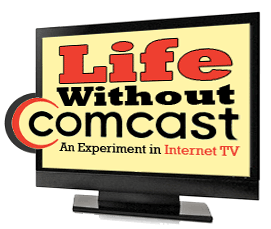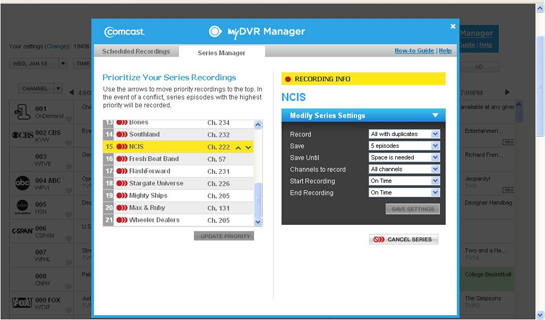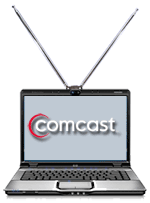 A year ago, I toyed with the idea of getting rid of cable and doing all my TV watching online. In the end, I kept Comcast–partially out of lethargy, but mostly because (A) cable is still a much better source of news-related programming than the Web, and (B) I’m very comfortable with my TiVo.
A year ago, I toyed with the idea of getting rid of cable and doing all my TV watching online. In the end, I kept Comcast–partially out of lethargy, but mostly because (A) cable is still a much better source of news-related programming than the Web, and (B) I’m very comfortable with my TiVo.
Reason (A) still strikes me as a significant argument in favor of keeping cable. With reason (B), however, I may be at a crossroads. My TiVo HD, which never worked very well, now isn’t working at all–it crashes every few minutes. I’m still trying to troubleshoot it, but I suspect that the drive is bad and will need to be replaced. That’ll require an investment of money and time, and while I may go through with it, I’m also flirting with the notion of retiring the TiVo and giving up cable.
News remains the biggest argument against doing so: I still like the idea of having CNN, CSPAN, Fox News, MSNBC, and other newsy outlets readily available. On the other hand, some of this stuff is available in podcast form–albeit after a delay–and it’s not like I’m glued to TV news every night. (I do, however, like to gorge on it when breaking events warrant, whether they involve election night or a celebrity death or the moving tale of a small boy swept away in his father’s experimental balloon.)
If I cut the cable and give up TiVo, what should I replace them with? I’m still not sure. I like Roku. I own an Apple TV that I don’t use much but would probably enjoy if I made an effort to rediscover it. The Boxee Box looks promising.
But the one box that offers access to the widest variety of stuff–including an endless supply of free material–is a PC. So I’m also toying with the notion of connecting a Windows box or Mac Mini to my Vizio and using it for Netflix, Boxee, YouTube, video podcasts, and a whole lot more. The major downside: Even a cheap PC costs a lot more than a Roku or a Boxee Box. But hey, if I’m no longer tithing to Comcast I’ll have some newfound cash to spend.
I don’t need to give up cable. I can afford it, and there are times that I’m very glad I have it. But more and more, I feel guilty about spending as much I do each month given how little of it I end up watching. It feels wasteful, like filling up your plate at an all-you-can-eat buffet when you know you’re only going to take a bite or two.
Here’s the part where I ask for your advice. What would you do? What are you doing?
 The New York Times’ Matt Richtel and Brian Stelter have a nice story today on the threat posed to traditional cable TV by free and low-cost Internet TV. Despite the growing sophistication of Web service, Americans still haven’t started cutting the cable cord in droves. Richtel and Stelter point to popular content that’s not available (legally) online–such as American Idol and True Blood–as a primary explanation for cable’s continued viability.
The New York Times’ Matt Richtel and Brian Stelter have a nice story today on the threat posed to traditional cable TV by free and low-cost Internet TV. Despite the growing sophistication of Web service, Americans still haven’t started cutting the cable cord in droves. Richtel and Stelter point to popular content that’s not available (legally) online–such as American Idol and True Blood–as a primary explanation for cable’s continued viability.

 Comcast, the nation’s dominant provider of cable TV and broadband services, has apparently decided it doesn’t like its 40-year-old moniker. The company isn’t changing its corporate name, but it’s
Comcast, the nation’s dominant provider of cable TV and broadband services, has apparently decided it doesn’t like its 40-year-old moniker. The company isn’t changing its corporate name, but it’s  A year ago, I toyed with the idea of
A year ago, I toyed with the idea of 
 Comcast’s
Comcast’s  Over at All Things Digital, Peter Kafka is reporting that he’s hearing that Apple wants to offer a
Over at All Things Digital, Peter Kafka is reporting that he’s hearing that Apple wants to offer a  After testing out its latest online offering with about 5,000 customers earlier this summer, Comcast is set to launch On Demand Online with all customers by the end of the year, the company is saying.
After testing out its latest online offering with about 5,000 customers earlier this summer, Comcast is set to launch On Demand Online with all customers by the end of the year, the company is saying.  Ivan Seidenberg thinks that more and more people are going to decide that they simply don’t need a landline telephone anymore. Which is an interesting take on things given that he’s CEO of landline giant Verizon. Over at the New York Times, Saul Hansell has posted a story in which
Ivan Seidenberg thinks that more and more people are going to decide that they simply don’t need a landline telephone anymore. Which is an interesting take on things given that he’s CEO of landline giant Verizon. Over at the New York Times, Saul Hansell has posted a story in which